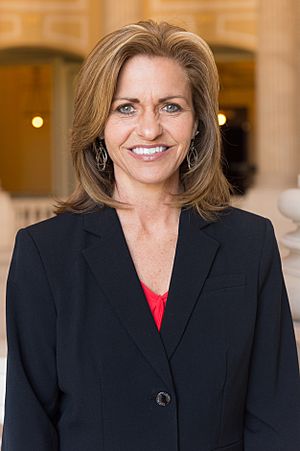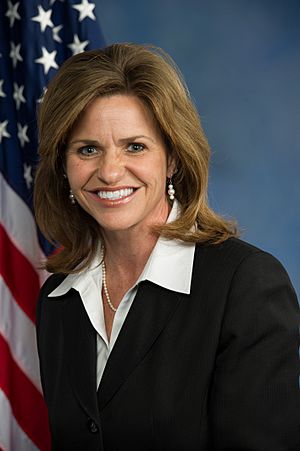Lynn Jenkins facts for kids
Quick facts for kids
Lynn Jenkins
|
|
|---|---|
 |
|
| Vice Chair of the House Republican Conference | |
| In office January 3, 2013 – January 3, 2017 |
|
| Leader | John Boehner Paul Ryan |
| Preceded by | Cathy McMorris Rodgers |
| Succeeded by | Doug Collins |
| Member of the U.S. House of Representatives from Kansas's 2nd district |
|
| In office January 3, 2009 – January 3, 2019 |
|
| Preceded by | Nancy Boyda |
| Succeeded by | Steve Watkins |
| 37th Kansas State Treasurer | |
| In office January 13, 2003 – January 3, 2009 |
|
| Governor | Kathleen Sebelius |
| Preceded by | Tim Shallenburger |
| Succeeded by | Dennis McKinney |
| Member of the Kansas Senate from the 20th district |
|
| In office January 8, 2001 – January 13, 2003 |
|
| Preceded by | Alicia Salisbury |
| Succeeded by | Bill Bunten |
| Member of the Kansas House of Representatives from the 52nd district |
|
| In office January 11, 1999 – January 8, 2001 |
|
| Preceded by | Vince Cook |
| Succeeded by | Lana Gordon |
| Personal details | |
| Born |
Lynn Haag
June 10, 1963 Holton, Kansas, U.S. |
| Political party | Republican |
| Spouse |
Scott Jenkins
(m. 1983; div. 2008) |
| Children | 2 |
| Education | Weber State University (BS) |
Lynn Haag Jenkins (born June 10, 1963) is an American politician and lobbyist. She served in the United States House of Representatives for Kansas's 2nd district from 2009 to 2019. A member of the Republican Party, she held several political offices in Kansas before being elected to Congress.
Jenkins is also a founder of Maggie's List. This is a group that helps conservative women get elected to government positions. In 2017, she announced she would not run for re-election. She left Congress in January 2019.
Contents
Early Life and Education
Lynn Jenkins was born in Holton, Kansas, and her family has lived in Kansas for six generations. She grew up on a dairy farm and went to high school in Holton.
She later went to Kansas State University and Weber State College. She studied accounting and economics. Jenkins is also a Certified Public Accountant, which means she is a professional expert in managing money.
Start of Her Political Career
Before going to Washington, D.C., Jenkins was active in Kansas politics. She served in the Kansas House of Representatives for two years. After that, she served one term in the Kansas Senate.
In 2002, she was elected as the Kansas State Treasurer. As treasurer, she was in charge of managing the state's money. During this time, she was also the president of the National Association of State Treasurers.
Serving in the U.S. House of Representatives
Jenkins represented Kansas in the U.S. House of Representatives for ten years. The House of Representatives is one of the two parts of the U.S. Congress, where laws for the whole country are made.
Elections
2008 Election
In 2007, Jenkins decided to run for a seat in the U.S. House of Representatives. She first had to win the Republican primary election. A primary is an election where voters choose which candidate from their party will run in the main election. Her opponent was Jim Ryun, who had been a representative before. Jenkins won the primary by about 1,000 votes.
In the main election, she faced the current representative, Nancy Boyda of the Democratic Party. Jenkins won the election with 51% of the vote.
Later Elections
Jenkins was re-elected four more times.
- 2010: She won with 63% of the vote.
- 2012: She won with 57% of the vote.
- 2014: She won with 57% of the vote.
- 2016: She won with 61% of the vote.
Time in Congress
During her time in Congress, Jenkins worked on many important issues. She was a member of several committees, including the powerful House Committee on Ways and Means, which deals with taxes and other money-related laws.
In 2017, Jenkins voted for a major tax law called the Tax Cuts and Jobs Act of 2017. She said the law would help middle-class families and create jobs.
Jenkins was also known for working with members of other political parties. One study ranked her as the 96th most bipartisan member of the House. Bipartisan means willing to work with the opposing political party to find solutions.
A Controversial Comment
In 2009, Jenkins made a comment that caused controversy. At a public meeting, she used the phrase "the great white hope" when talking about new Republican leaders. This phrase originally comes from the early 1900s. It was used to describe white boxers who people hoped would defeat the Black world heavyweight champion, Jack Johnson.
Jenkins later apologized for her comment. She said she did not know the negative history of the phrase. She explained that she only meant to say there were bright new leaders in her party.
Lobbying Career
After leaving Congress, Jenkins started a lobbying firm called LJ Strategies. A lobbyist is someone who is paid to talk to lawmakers and try to influence their decisions on behalf of a person or group.
What Did Lynn Jenkins Believe?
Jenkins was known for having mostly conservative views. Conservatism is a political viewpoint that often supports lower taxes, less government spending, and traditional values.
Economic Issues
Jenkins believed that cutting government spending was the best way to create jobs and help the economy grow. She was against raising taxes to balance the government's budget.
Energy and Environment
Jenkins supported building the Keystone XL Pipeline, an oil pipeline system. She said it would create jobs for Americans. She also supported using government money to help develop renewable energy sources like wind and solar power. However, she was against the government making rules to limit greenhouse gas emissions.
Gun Laws
Jenkins received a high rating from the NRA Political Victory Fund, a group that supports gun rights. She supported background checks for people buying guns at gun shows.
Healthcare
Jenkins was against the Affordable Care Act, also known as "Obamacare." She supported efforts to cancel the law and replace it with a different healthcare system.
Immigration
Jenkins believed in making the border between the U.S. and Mexico more secure. She supported using more technology and fences along the border. She was against giving a path to citizenship for immigrants who came to the country illegally.
Personal Life
Jenkins has two children, Hayley and Hayden. She was married to Scott Jenkins for 25 years before they divorced in 2008. She is a member of the United Methodist Church.
See also
- Women in the United States House of Representatives
 | Janet Taylor Pickett |
 | Synthia Saint James |
 | Howardena Pindell |
 | Faith Ringgold |


